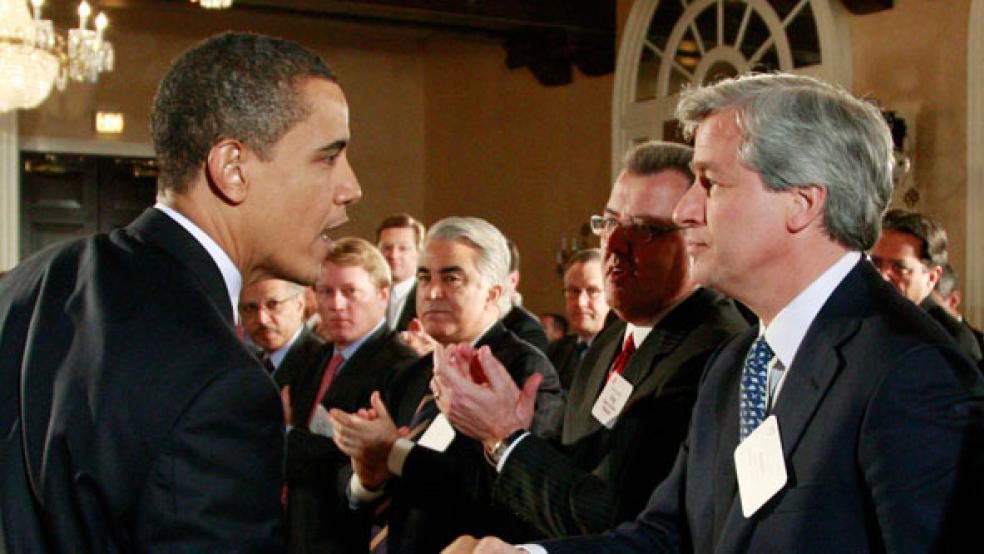Jamie Dimon has landed in the penalty box with a thud.
Not long ago the CEO of JPMorgan Chase was donating to President Obama’s campaigns and Obama was calling Dimon one of the country’s “smartest bankers.” That was before Dimon became one of Wall Street’s most outspoken critics of the Obama administration’s “constant attack on business” – before the president launched his campaign against “fat cat” bankers.

It was also before the $6.2 billion “London whale” trade tarnished Jamie Dimon’s sterling reputation.
Today the love fest has cooled and the country’s top bank is being hit from all sides with investigations and accusations of misdeeds – at least eight that we know about. Is this multi-pronged ambush a sign that JPMorgan was not well managed after all, or is the White House trying to bring Dimon to heel?
RELATED: THE REAL RISK AT JPMORGAN ISN'T ITS LEGAL MESS
In a note to clients, long-time bank analyst Dick Bove writes “the United States government has made it a priority to break this company. In my view, it wants the firm broken up and it wants the management changed.” As Bove points out, despite JPMorgan Chase’s extraordinary performance – it is one of the nation’s top five money-making businesses across all industries – the media and the White House continue to insinuate that it is too big to manage, and too big to fail.
The Obama administration, for sure, seems to be “piling on.” It was recently revealed that the SEC is investigating the bank’s past hiring of the children of important Chinese nationals. The bank, like every organization that hopes to be successful in China, has attempted to get close to the country’s power brokers. One avenue they have chosen is to hire the son of the chairman of a state-controlled financial conglomerate and the daughter of a former deputy engineer of the Chinese railway ministry.
The SEC is trying to link business done by JPMorgan with the China Everbright group or with a prominent railroad construction company to these young people, thus portraying the hires as bribes. A lengthy report in The New York Times claims that JPMorgan did indeed do deals with both groups. Proving cause and effect, though, may be tough.
Almost certainly JPMorgan Chase was not alone in traveling this road. The “princelings” of China are expected to become future leaders. Reporting by Bloomberg on the heirs to Deng Xiaoping and his closest associates, the now deceased Eight Immortals, revealed just how influential this group is. “Three children alone – including Deng’s son-in-law He Ping and Chen Yuan, the son of Mao Zedong’s economic czar Chen Yun – led or still run state-owned companies that had combined assets of about $1.6 trillion in 2011, or the equivalent of more than a fifth of China’s annual economic output.”
HARVARD SPEAKS MANDARIN, TOO
It is not only the business community that has tried to tap China’s upcoming leaders – American universities have also played that game. The daughter of China President Xi Jinping studied at Harvard at the same time the son of disgraced party boss Bo Xilai attended the Kennedy School. Harvard in fact boasts quite the alumni group, including a member of the Politburo, the chairman of the China International Capital Corporation, the governor of Shaanxi Province, and the minister of commerce. It has been reported that “at least five of the nine members of the Politburo Standing Committee, China’s top decision-making body, have children or grandchildren who have studied in the U.S.”
The targeting of JPMorgan Chase for hiring well-connected young people – in China or elsewhere – seems absurd. The bank is facing a raft of other allegations, many of which smack of regulatory overreach. The first blow landed when the bank was charged with misleading investors who bought mortgage backed securities peddled by Bear Stearns. Since Morgan bought the crippled broker during the financial meltdown at the request of the government, and the misrepresentations predated the purchase that seems a mite unfair.
Meanwhile, the bank faces a number of investigations related to its “London whale” trading losses. U.S. Attorney Preet Bharara has leveled criminal charges against two former employees for understating losses on the trades, while the SEC has taken the unusual path of demanding that the bank admit to wrongdoing.
The media reported the sizeable losses as proof the bank was too big to manage, but mostly neglected to point out that the company nonetheless earned a solid profit in spite of the trading debacle. Most recently, Bharara announced the Justice Department is looking into whether the bank manipulated energy markets, even though Morgan recently agreed to pay a $410 million fine to settle similar charges brought by the Federal Energy Regulatory Commission.
This tsunami of investigations and charges seems at odds with J.P. Morgan Chase’s former squeaky-clean reputation. But, it may be just those accolades that have brought the wrath of a spurned Obama down on Dimon’s head. While collecting an award as “Best Executive of the Year” last year at the University of Rochester, Dimon lashed out at the White House’s “ridiculous” investigations into oil price speculators and lauded the recommendations of the Simpson-Bowles Commission – proposals that President Obama ignored.
Hints of the somewhat personal nature of this tussle between Obama and Dimon are found in the Justice Department’s announcement of charges brought in the “London whale” case. Bharara states “this was not a tempest in a teapot,” repeating the dismissive words Dimon used early on to characterize the losses.
The Obama administration has had to walk a fine line between satisfying critics who want to see the big banks hobbled and the need for a healthy financial industry, capable of extending the credit needed to get the U.S. back on its feet. Despite the much-ballyhooed passage of Dodd-Frank, most see the banking industry operating much as it did before the financial crisis. One of President Obama’s first orders of business as he retuned from Martha’s Vineyard, according to The New York Times, was to push his financial team to finish their overhaul of financial industry regulations.
Mr. Obama appears eager to rein in our big banks and JP Morgan Chase in particular. Or, he may just be tired of headlines that read “Dimon Derides Obama.”






